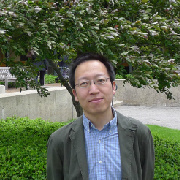

|
He Bing, deputy dean of the law school of China University of Political Science and Law, drove to the campus of the Communication University of China to give a lecture to its PhD students. He was stopped at the south gate. Because the student who met him at the gate did not obtain the permit in advance, He was not allowed to drive onto the campus. He tried to explain the situation to the security guard and showed his business card. But the guard did not budge. In the end, he had to use a side entrance. The incident did not become a teacup storm until He complained on his micro blog: "Do you think you're protecting Zhongnanhai?" He was referring to the compound of the country's top leadership. Senior Communication University officer defended the guard's action, saying it was the right thing to do. This opened a can of worms that includes the debate over whether a law professor should breach a campus rule. Whether he was right or wrong, He touched a nerve when he argued for more "openness" among China's higher learning institutions. |

|
Facilities, including sports venues, are also public resources, and therefore cannot be exclusively owned by schools. But the education authorities close schools every weekend and holiday because of "safety threats". However,these facilities in schools should be put into full use for the good of the public. Therefore, the government should make related policies to offer these services to citizens, allowing them more access to schools and universities.
|
|
The incident that Professor He Bing underwent in the Communication University of China has triggered a heated debate. Regulations are required to be followed, but not in such rigid terms, just like police officers should not prevent a severely sick person from going hospital because he breaks a traffic rule. Professor He Bing is a professor who was simply going to his class according to his arrangement with the (communication) university. If a school's primary mission is to teach, shouldn't the school staff, especially the leaders, learn how to treat a guest teacher? |
|
Rules are expected to be followed without exceptions; therefore, it was completely reasonable to refuse the entry of Professor He's car unless he has a permit. Considering the already much crowded campus of the Communication University, it is in the interest of the students to restrict the amount of cars. In fact, the security guard only blocked the car, not professor He Bing, which therefore cannot be claimed as an issue of "openness". Besides, Communication University is not the only Chinese university that has a gate and employed security guards. |
|
Putting the question of who is right or who is wrong aside, Chinese universities are, indeed, secluded: many universities' gates are closely guarded. Identifications and registration are sometimes not enough; some buildings have a secondary security check and there is little possibility that you can enter even if an emergency such as a call of nature arises. How much money do universities spend on security every year? And is it necessary to guard campuses like they are military bases? |
|
Professor He Bing is entitled to air his opinion that the Communication University is "not open enough". However, when he was entering the campus, he had to abide by its rule that "no admittance for cars without a pass". Just as it is professor He's responsibility to teach students, isn't it the security guard's responsibility to guard the campus gate? |
|
When some people hear about school shootings in the US, they simply blame and criticize the schools' "poor" management as well as incompetent security guards. But if it is they who are refused privileges such as entering the campus freely, they will immediately become indignant, complaining about "fortress-like" Chinese campuses while praising the "openness" of American universities. It is these peoples' "psychological walls" that should be removed. |

|
Nowadays, it seems much of the psychological wall has been removed. One does not need to complete any paperwork to sit in on most classes or lectures in the nation's ivory towers. If you do not care for accumulating credits, you can pretty much take any course you like. But the physical wall is another matter. It is unlikely - at least not in the foreseeable future - that college campuses in China will blend into the rest of an urban or a suburban landscape the way a typical US-based university does. For one thing, a school does not want to share its resources, such as canteens with subsidized food or sports facilities that are only available to the faculty and the student body. However, we should take steps to move toward equality for all. A college classroom that takes in non-students may cause a little inconvenience for the students properly enrolled in the course but the long-term benefits of educating a larger slice of the demographic pie outweigh the annoyance of part of the student body. Likewise, a residential compound may have claim to a playground on its premises but occasionally letting in a neighbor or two would not create much trouble. There's so much inequity in the distribution of social resources that the occasional circumvention of some dubious rules may help with the balance of power and the creation of harmony in society. In a bigger picture, we are all neighbors. |
 @Hamigov Offical Weibo Account of Hami Municipal Government
@Hamigov Offical Weibo Account of Hami Municipal Government @Tongzongjin Associate professor of China University of Political Science and Law
@Tongzongjin Associate professor of China University of Political Science and Law @Wang Xiaotong Sina Weibo user
@Wang Xiaotong Sina Weibo user @Wangjianxun Associate professor of China University of Political Science and Law
@Wangjianxun Associate professor of China University of Political Science and Law @Huashengluntan Official Sina Weibo account of Huasheng Forum
@Huashengluntan Official Sina Weibo account of Huasheng Forum @Ainiwodemao Sina Weibo user
@Ainiwodemao Sina Weibo user